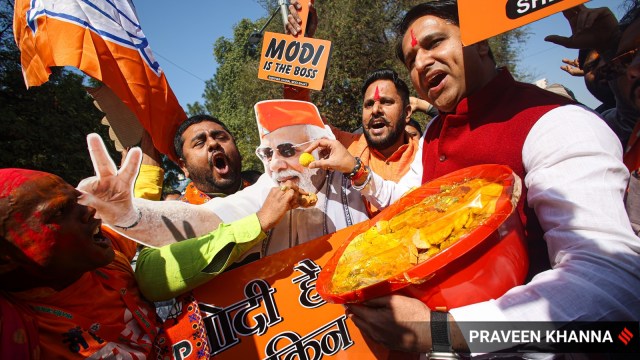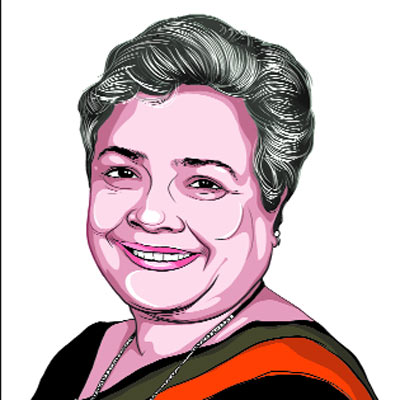

Feb 8, 2025 16:03 IST First published on: Feb 8, 2025 at 16:03 IST
It is February 8, Jaya Ekadashi in the month of Paush, and by noon, it is clear as day that the BJP has conclusively won the Delhi Assembly elections after a drought of over two decades. The AAP, winner of three past Assembly elections, has lost ingloriously. The TV pundits are busy with their usual I-told-you-sos and, nevertheless-it needs-be-saids. But the tamasha, so long in the making, was over even before some anchor in silk began to sing or an elated psephologist broke into a dance.
As a seat of power, Delhi has been a phoenix with a monumental history behind it. Countless tribes, clans, raiders and upstarts have won, been defeated in, razed and rebuilt Delhi since the mythical Dwapar Yug. All because it is the dehali or threshold (Ramchandra Gandhi’s interpretation) for stepping into the heart of Bharat that is India today.The fight for the Union Territory this time was intense as it was being ruled by twin powers: A Lt Governor appointed by the Centre and an elected government headed by a popular Chief Minister — Arvind Kejriwal who came in promising a radically different kind of peoples’ politics and stayed on to win three successive Assembly elections.
Story continues below this ad
Kejriwal excelled in dramatic overtures and symbolic gestures — sleeping with his quilt out in the open demanding central assistance for Delhi’s poor, climbing electric poles and disconnecting wires, electioneering with his trademark muffler and a broomstick, his party’s symbol, badmouthing his rivals, including fellow members of the INDIA bloc who were contesting against his candidates since he had contested against theirs in Punjab and Haryana. High drama marked Kejriwal’s entire tenure as CM. On the evening of February 7, a central team of Anti Corruption Bureau (ACB) officials went knocking on his doors. It sought explanations for his allegations about the BJP offering money to his men for defecting. This played down a roaring ruckus in Parliament over Indian aliens being shackled and sent home aboard a military plane to Punjab. But the AAP has been a great teacher of drama and has produced thespians like Swati Maliwal, an estranged member of the party who remains one of its sitting members in Rajya Sabha. She went on the warpath against her own parent organisation and led with three truckloads of trash and bottles of contaminated water to the CM’s house to prove how filth had made Delhi unliveable.
Except for crusty old Delhiites who have seen governments come and go, young India retains a deep curiosity about and an anticipation of something extraordinary each time poll results are to be announced. Some still feel no politician can be written off permanently in India. If Delhi has fallen to the aggressive juggernaut of the BJP, it cannot mean a snuffing out of the AAP. That may be true but with the colourful Kejriwal and his team out for five years, one can expect a gradual removal of the last vestiges of a history that began with the anti-corruption, anti-elitist politics of the Anna Hazare movement. With his spectacled face and muffler, Kejriwal was viewed as a representative of the common man. One of the winners, BJP’s Parvesh Verma, son of a former chief minister, is now telling the media that AAP lost because of issues of serious corruption. Irony died a second time when maverick poet-turned-politician-turned-poet-again Kumar Vishwas remarked that AAP lost because of its ahankaar (hubris). It performed a hattrick when the Congress spokesperson claimed that getting zero votes a third time is not a matter of worry or shame but “a golden opportunity”.
Delhi media’s immediate analysis of the “event” appears less about hard news or worries about the recent changes made in Section 93(2) Conduct of Election Rules that have made a transparent and timely release of data by the Election Commission to the public a rarity or the EC’s insistence that there is no legality that demands it share the form 17C data immediately, releasing it nearly 48 hours after the last vote was cast. It is not even debating if the mythical mahila vote bank that led all the three major parties – the BJP, Congress and AAP – to make financially unsustainable promises of depositing monthly payments in their bank accounts under this or that yojana paid off. Despite a marginal increase in the numbers of female voters over male ones, it appears that both the haves and the have nots came out and voted for the same things: Roti, kapda, makaan and a cleaner city.
most read
Story continues below this ad
The BJP, as is its style, has quickly gone into a huddle to discuss the lessons it may have for its party workers to win the next Assembly elections in Bihar, where a visible leadership vacuum exists, where INDIA is fast vanishing in the mists of egos and Nitish Kumar now appears to be a shadow of his former doughty self.
Digital media has given our elections a dimension that no other event in the history of this city with nine lives has ever had. Everyone with a microphone thrust in his or her face is an “opinion maker”. If we wish to understand the real significance of Delhi elections, we’ll need to look elsewhere – at people with more sensible, less dramatic and long-term insights about India’s collective future. We also need the detached voice of a dry wit, witness to an earlier epoch when Delhi was crumbling under the East India Company and the emperor was a prisoner in his palace amid whispers of intrigues. We need a voice like Ghalib to tell us: “Bazeecha e Atfal hai Duniya mere aage/ Hota hai Shab O Roz Tamasha Mere aagey (All day long like a playfield for children, the world/ unfolds a new spectacle before my eyes)”.
The writer is former chairperson, Prasar Bharati


